Organizational Behaviour: Impact of Culture, Power, Motivation
VerifiedAdded on 2023/06/14
|13
|4486
|199
Report
AI Summary
This report provides an analysis of organizational behaviour, focusing on the impact of culture, politics, and power on individual and team performance, with a specific focus on Waitrose. It explores Handy's typology to explain the influence of culture, French and Raven's model to understand power dynamics, and the impact of organizational politics on decision-making. Furthermore, the report examines content and process theories of motivation, including Maslow's need hierarchy theory and Vroom's expectancy theory, to understand how Waitrose can effectively attain its goals. The study also touches upon factors that contribute to effective team cooperation and applies organizational behaviour concepts and philosophies within the context of Waitrose, ultimately concluding with key insights and recommendations.
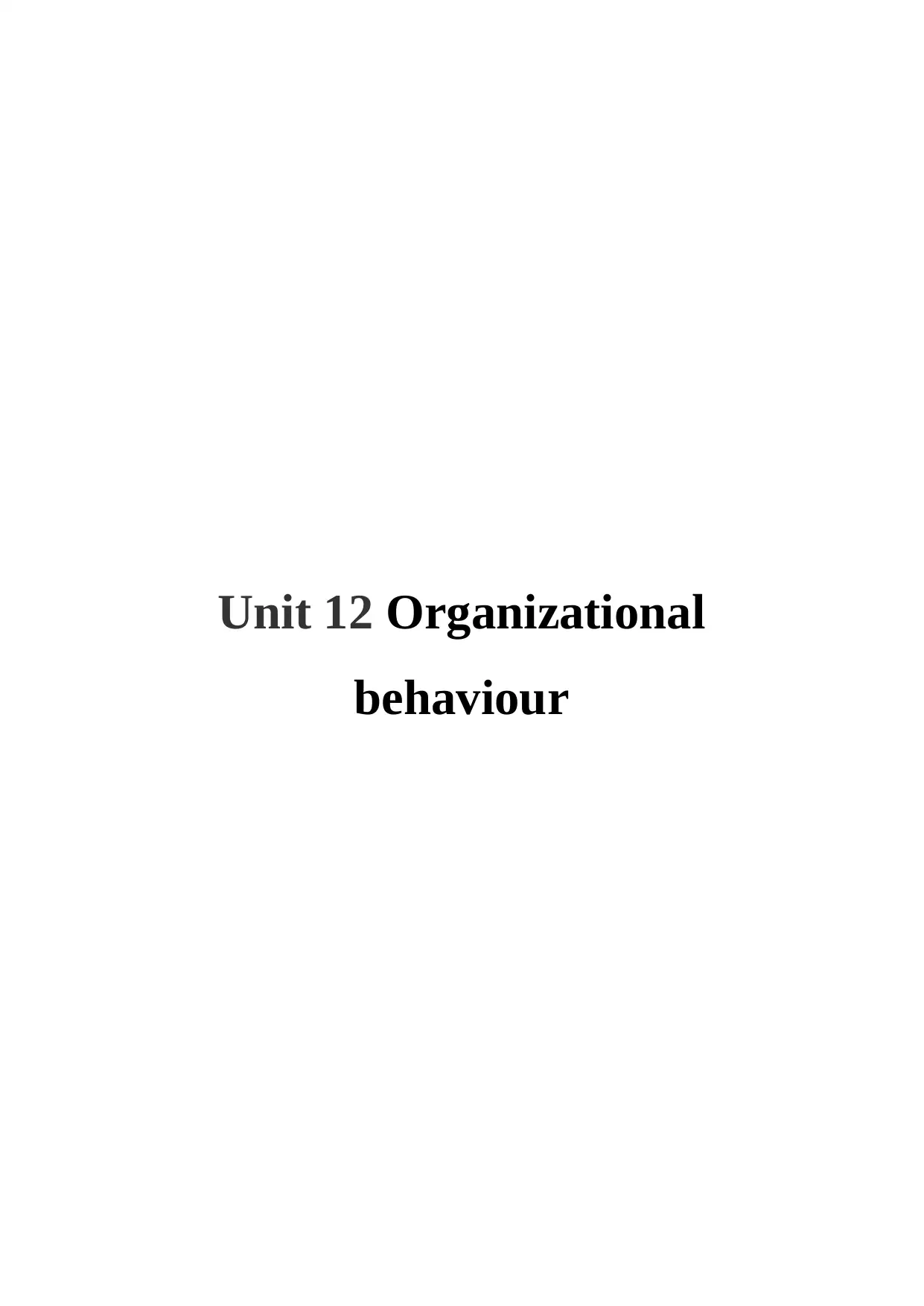
Unit 12 Organizational
behaviour
behaviour
Paraphrase This Document
Need a fresh take? Get an instant paraphrase of this document with our AI Paraphraser
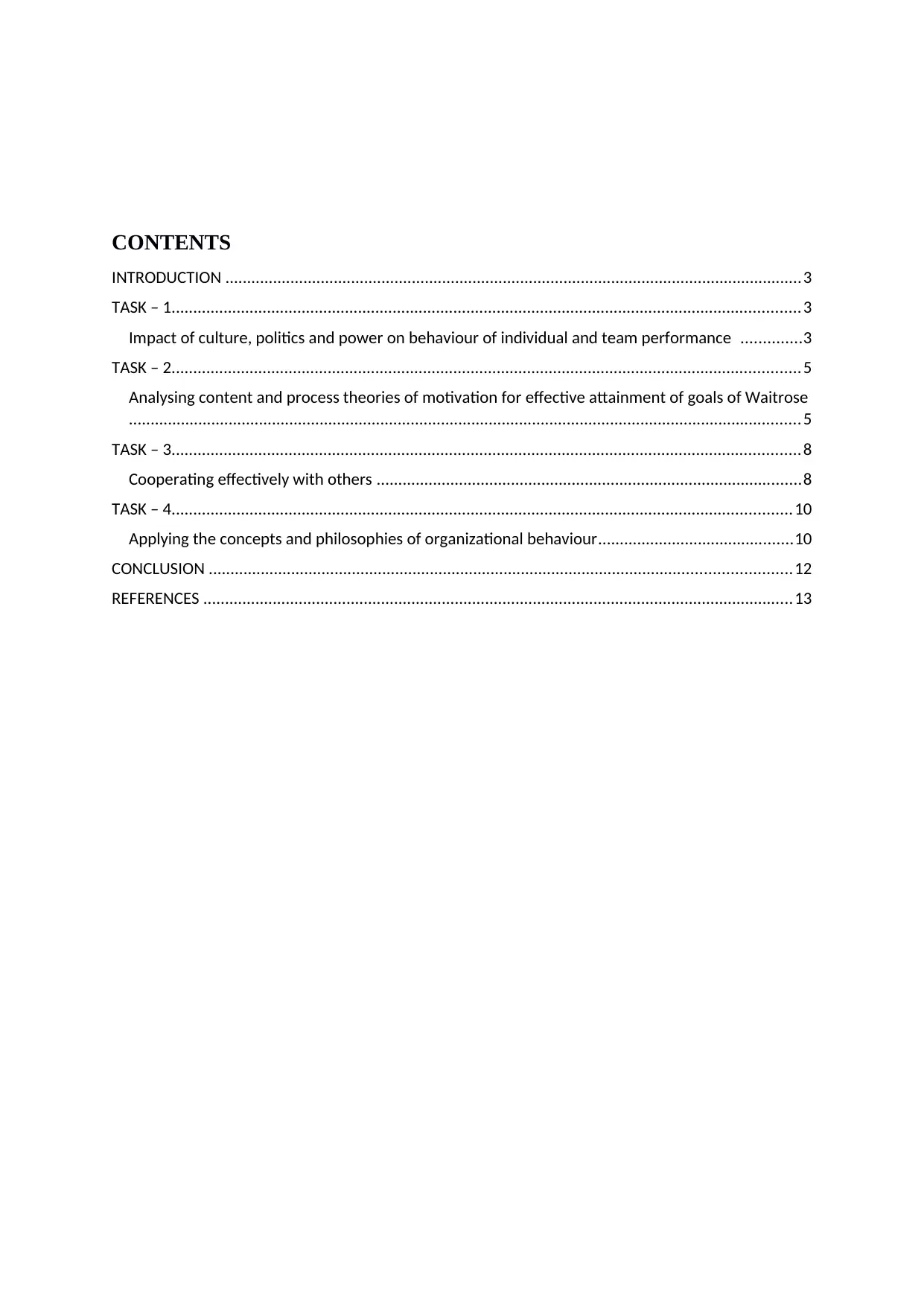
CONTENTS
INTRODUCTION .....................................................................................................................................3
TASK – 1.................................................................................................................................................3
Impact of culture, politics and power on behaviour of individual and team performance ..............3
TASK – 2.................................................................................................................................................5
Analysing content and process theories of motivation for effective attainment of goals of Waitrose
...........................................................................................................................................................5
TASK – 3.................................................................................................................................................8
Cooperating effectively with others ..................................................................................................8
TASK – 4...............................................................................................................................................10
Applying the concepts and philosophies of organizational behaviour.............................................10
CONCLUSION ......................................................................................................................................12
REFERENCES ........................................................................................................................................13
INTRODUCTION .....................................................................................................................................3
TASK – 1.................................................................................................................................................3
Impact of culture, politics and power on behaviour of individual and team performance ..............3
TASK – 2.................................................................................................................................................5
Analysing content and process theories of motivation for effective attainment of goals of Waitrose
...........................................................................................................................................................5
TASK – 3.................................................................................................................................................8
Cooperating effectively with others ..................................................................................................8
TASK – 4...............................................................................................................................................10
Applying the concepts and philosophies of organizational behaviour.............................................10
CONCLUSION ......................................................................................................................................12
REFERENCES ........................................................................................................................................13
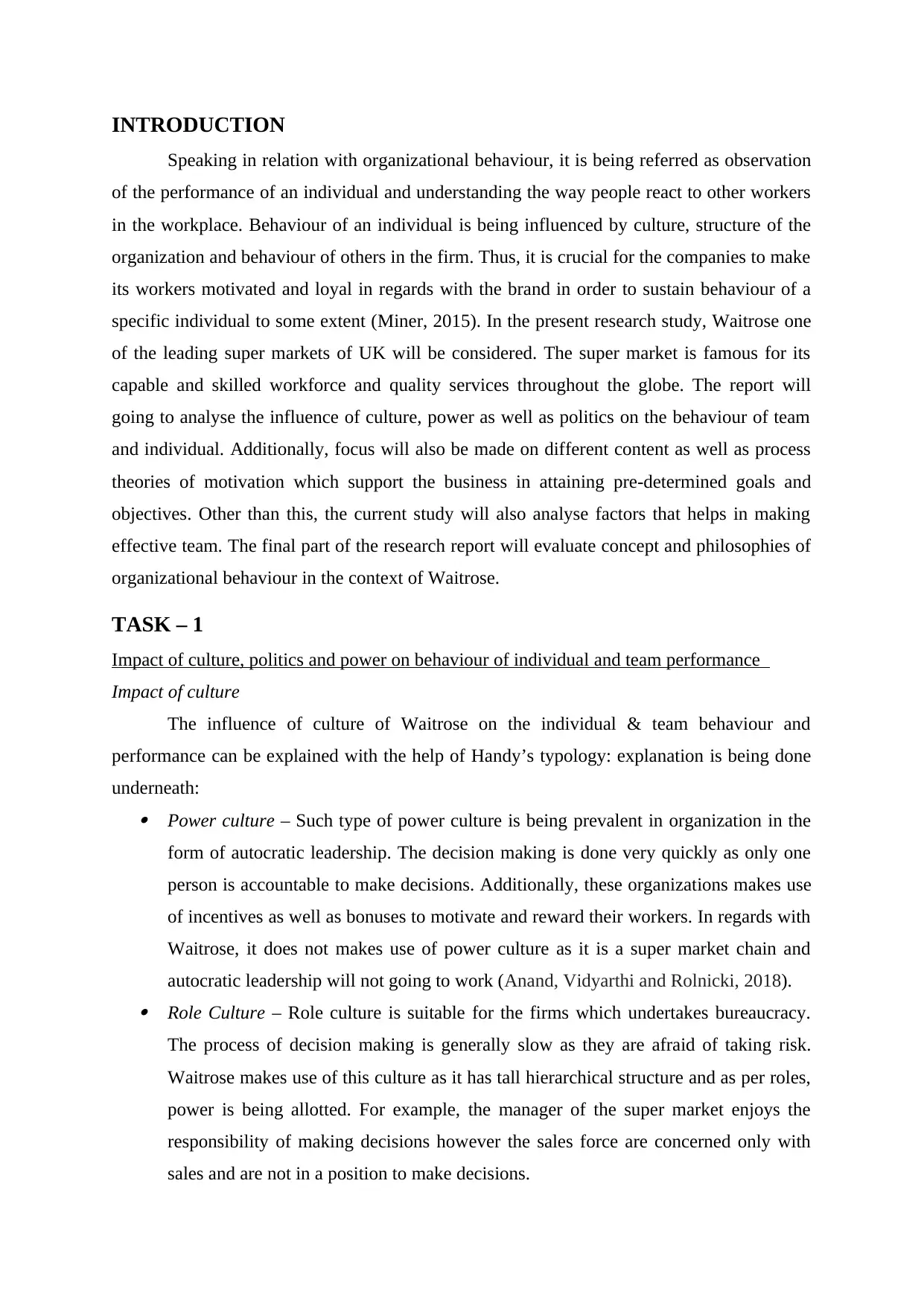
INTRODUCTION
Speaking in relation with organizational behaviour, it is being referred as observation
of the performance of an individual and understanding the way people react to other workers
in the workplace. Behaviour of an individual is being influenced by culture, structure of the
organization and behaviour of others in the firm. Thus, it is crucial for the companies to make
its workers motivated and loyal in regards with the brand in order to sustain behaviour of a
specific individual to some extent (Miner, 2015). In the present research study, Waitrose one
of the leading super markets of UK will be considered. The super market is famous for its
capable and skilled workforce and quality services throughout the globe. The report will
going to analyse the influence of culture, power as well as politics on the behaviour of team
and individual. Additionally, focus will also be made on different content as well as process
theories of motivation which support the business in attaining pre-determined goals and
objectives. Other than this, the current study will also analyse factors that helps in making
effective team. The final part of the research report will evaluate concept and philosophies of
organizational behaviour in the context of Waitrose.
TASK – 1
Impact of culture, politics and power on behaviour of individual and team performance
Impact of culture
The influence of culture of Waitrose on the individual & team behaviour and
performance can be explained with the help of Handy’s typology: explanation is being done
underneath: Power culture – Such type of power culture is being prevalent in organization in the
form of autocratic leadership. The decision making is done very quickly as only one
person is accountable to make decisions. Additionally, these organizations makes use
of incentives as well as bonuses to motivate and reward their workers. In regards with
Waitrose, it does not makes use of power culture as it is a super market chain and
autocratic leadership will not going to work (Anand, Vidyarthi and Rolnicki, 2018). Role Culture – Role culture is suitable for the firms which undertakes bureaucracy.
The process of decision making is generally slow as they are afraid of taking risk.
Waitrose makes use of this culture as it has tall hierarchical structure and as per roles,
power is being allotted. For example, the manager of the super market enjoys the
responsibility of making decisions however the sales force are concerned only with
sales and are not in a position to make decisions.
Speaking in relation with organizational behaviour, it is being referred as observation
of the performance of an individual and understanding the way people react to other workers
in the workplace. Behaviour of an individual is being influenced by culture, structure of the
organization and behaviour of others in the firm. Thus, it is crucial for the companies to make
its workers motivated and loyal in regards with the brand in order to sustain behaviour of a
specific individual to some extent (Miner, 2015). In the present research study, Waitrose one
of the leading super markets of UK will be considered. The super market is famous for its
capable and skilled workforce and quality services throughout the globe. The report will
going to analyse the influence of culture, power as well as politics on the behaviour of team
and individual. Additionally, focus will also be made on different content as well as process
theories of motivation which support the business in attaining pre-determined goals and
objectives. Other than this, the current study will also analyse factors that helps in making
effective team. The final part of the research report will evaluate concept and philosophies of
organizational behaviour in the context of Waitrose.
TASK – 1
Impact of culture, politics and power on behaviour of individual and team performance
Impact of culture
The influence of culture of Waitrose on the individual & team behaviour and
performance can be explained with the help of Handy’s typology: explanation is being done
underneath: Power culture – Such type of power culture is being prevalent in organization in the
form of autocratic leadership. The decision making is done very quickly as only one
person is accountable to make decisions. Additionally, these organizations makes use
of incentives as well as bonuses to motivate and reward their workers. In regards with
Waitrose, it does not makes use of power culture as it is a super market chain and
autocratic leadership will not going to work (Anand, Vidyarthi and Rolnicki, 2018). Role Culture – Role culture is suitable for the firms which undertakes bureaucracy.
The process of decision making is generally slow as they are afraid of taking risk.
Waitrose makes use of this culture as it has tall hierarchical structure and as per roles,
power is being allotted. For example, the manager of the super market enjoys the
responsibility of making decisions however the sales force are concerned only with
sales and are not in a position to make decisions.
⊘ This is a preview!⊘
Do you want full access?
Subscribe today to unlock all pages.

Trusted by 1+ million students worldwide
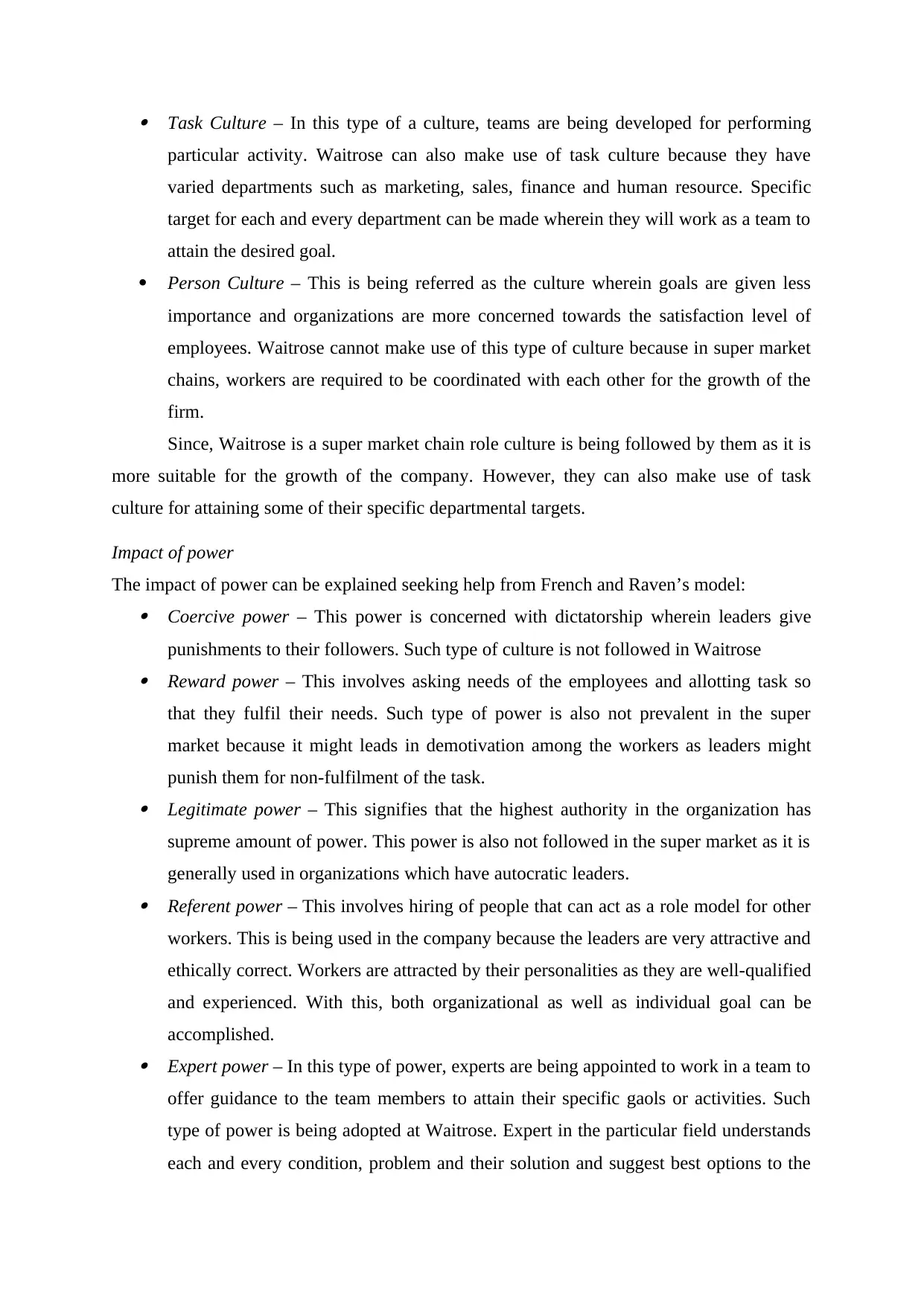
Task Culture – In this type of a culture, teams are being developed for performing
particular activity. Waitrose can also make use of task culture because they have
varied departments such as marketing, sales, finance and human resource. Specific
target for each and every department can be made wherein they will work as a team to
attain the desired goal.
Person Culture – This is being referred as the culture wherein goals are given less
importance and organizations are more concerned towards the satisfaction level of
employees. Waitrose cannot make use of this type of culture because in super market
chains, workers are required to be coordinated with each other for the growth of the
firm.
Since, Waitrose is a super market chain role culture is being followed by them as it is
more suitable for the growth of the company. However, they can also make use of task
culture for attaining some of their specific departmental targets.
Impact of power
The impact of power can be explained seeking help from French and Raven’s model: Coercive power – This power is concerned with dictatorship wherein leaders give
punishments to their followers. Such type of culture is not followed in Waitrose Reward power – This involves asking needs of the employees and allotting task so
that they fulfil their needs. Such type of power is also not prevalent in the super
market because it might leads in demotivation among the workers as leaders might
punish them for non-fulfilment of the task. Legitimate power – This signifies that the highest authority in the organization has
supreme amount of power. This power is also not followed in the super market as it is
generally used in organizations which have autocratic leaders. Referent power – This involves hiring of people that can act as a role model for other
workers. This is being used in the company because the leaders are very attractive and
ethically correct. Workers are attracted by their personalities as they are well-qualified
and experienced. With this, both organizational as well as individual goal can be
accomplished. Expert power – In this type of power, experts are being appointed to work in a team to
offer guidance to the team members to attain their specific gaols or activities. Such
type of power is being adopted at Waitrose. Expert in the particular field understands
each and every condition, problem and their solution and suggest best options to the
particular activity. Waitrose can also make use of task culture because they have
varied departments such as marketing, sales, finance and human resource. Specific
target for each and every department can be made wherein they will work as a team to
attain the desired goal.
Person Culture – This is being referred as the culture wherein goals are given less
importance and organizations are more concerned towards the satisfaction level of
employees. Waitrose cannot make use of this type of culture because in super market
chains, workers are required to be coordinated with each other for the growth of the
firm.
Since, Waitrose is a super market chain role culture is being followed by them as it is
more suitable for the growth of the company. However, they can also make use of task
culture for attaining some of their specific departmental targets.
Impact of power
The impact of power can be explained seeking help from French and Raven’s model: Coercive power – This power is concerned with dictatorship wherein leaders give
punishments to their followers. Such type of culture is not followed in Waitrose Reward power – This involves asking needs of the employees and allotting task so
that they fulfil their needs. Such type of power is also not prevalent in the super
market because it might leads in demotivation among the workers as leaders might
punish them for non-fulfilment of the task. Legitimate power – This signifies that the highest authority in the organization has
supreme amount of power. This power is also not followed in the super market as it is
generally used in organizations which have autocratic leaders. Referent power – This involves hiring of people that can act as a role model for other
workers. This is being used in the company because the leaders are very attractive and
ethically correct. Workers are attracted by their personalities as they are well-qualified
and experienced. With this, both organizational as well as individual goal can be
accomplished. Expert power – In this type of power, experts are being appointed to work in a team to
offer guidance to the team members to attain their specific gaols or activities. Such
type of power is being adopted at Waitrose. Expert in the particular field understands
each and every condition, problem and their solution and suggest best options to the
Paraphrase This Document
Need a fresh take? Get an instant paraphrase of this document with our AI Paraphraser
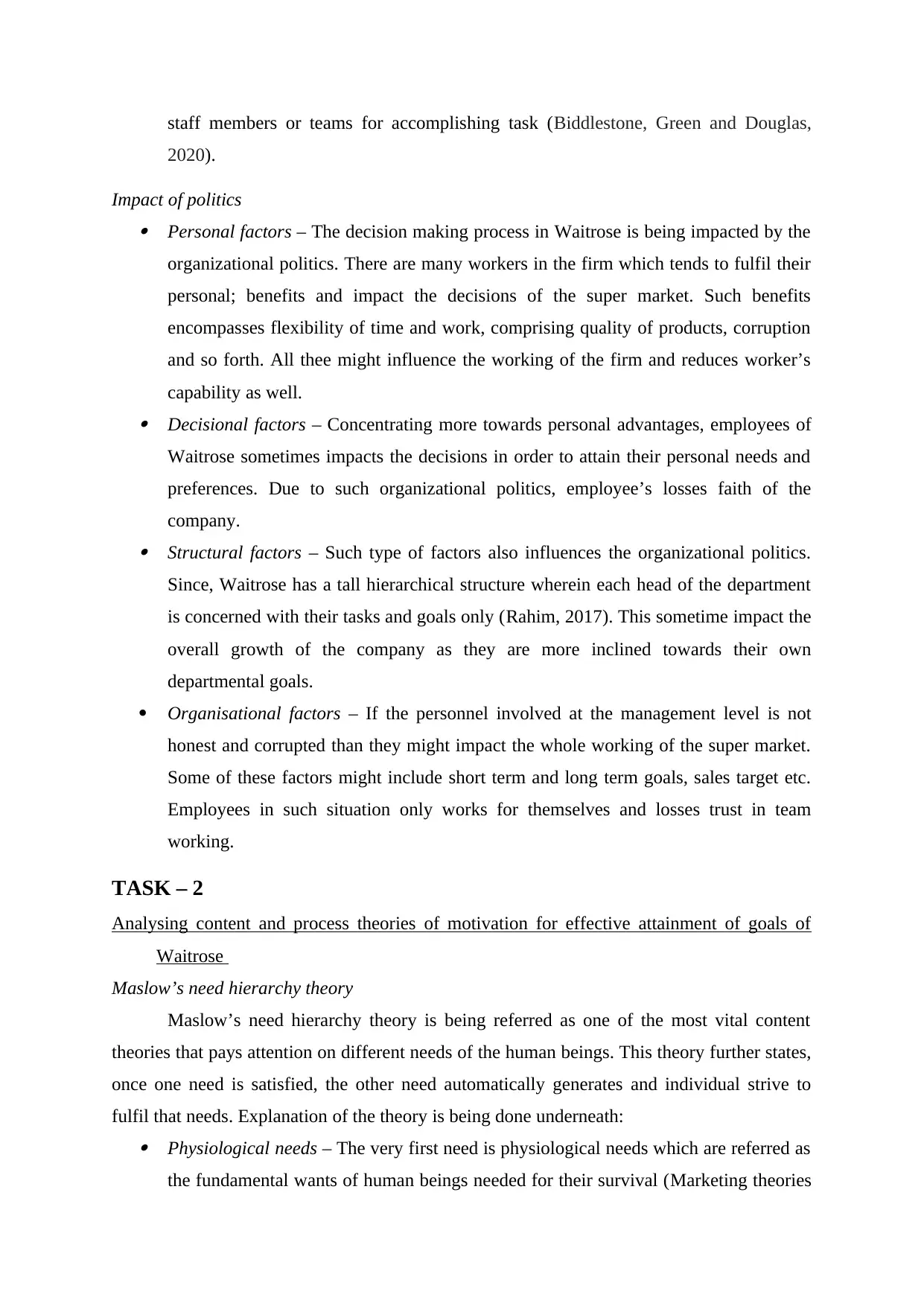
staff members or teams for accomplishing task (Biddlestone, Green and Douglas,
2020).
Impact of politics Personal factors – The decision making process in Waitrose is being impacted by the
organizational politics. There are many workers in the firm which tends to fulfil their
personal; benefits and impact the decisions of the super market. Such benefits
encompasses flexibility of time and work, comprising quality of products, corruption
and so forth. All thee might influence the working of the firm and reduces worker’s
capability as well. Decisional factors – Concentrating more towards personal advantages, employees of
Waitrose sometimes impacts the decisions in order to attain their personal needs and
preferences. Due to such organizational politics, employee’s losses faith of the
company. Structural factors – Such type of factors also influences the organizational politics.
Since, Waitrose has a tall hierarchical structure wherein each head of the department
is concerned with their tasks and goals only (Rahim, 2017). This sometime impact the
overall growth of the company as they are more inclined towards their own
departmental goals.
Organisational factors – If the personnel involved at the management level is not
honest and corrupted than they might impact the whole working of the super market.
Some of these factors might include short term and long term goals, sales target etc.
Employees in such situation only works for themselves and losses trust in team
working.
TASK – 2
Analysing content and process theories of motivation for effective attainment of goals of
Waitrose
Maslow’s need hierarchy theory
Maslow’s need hierarchy theory is being referred as one of the most vital content
theories that pays attention on different needs of the human beings. This theory further states,
once one need is satisfied, the other need automatically generates and individual strive to
fulfil that needs. Explanation of the theory is being done underneath: Physiological needs – The very first need is physiological needs which are referred as
the fundamental wants of human beings needed for their survival (Marketing theories
2020).
Impact of politics Personal factors – The decision making process in Waitrose is being impacted by the
organizational politics. There are many workers in the firm which tends to fulfil their
personal; benefits and impact the decisions of the super market. Such benefits
encompasses flexibility of time and work, comprising quality of products, corruption
and so forth. All thee might influence the working of the firm and reduces worker’s
capability as well. Decisional factors – Concentrating more towards personal advantages, employees of
Waitrose sometimes impacts the decisions in order to attain their personal needs and
preferences. Due to such organizational politics, employee’s losses faith of the
company. Structural factors – Such type of factors also influences the organizational politics.
Since, Waitrose has a tall hierarchical structure wherein each head of the department
is concerned with their tasks and goals only (Rahim, 2017). This sometime impact the
overall growth of the company as they are more inclined towards their own
departmental goals.
Organisational factors – If the personnel involved at the management level is not
honest and corrupted than they might impact the whole working of the super market.
Some of these factors might include short term and long term goals, sales target etc.
Employees in such situation only works for themselves and losses trust in team
working.
TASK – 2
Analysing content and process theories of motivation for effective attainment of goals of
Waitrose
Maslow’s need hierarchy theory
Maslow’s need hierarchy theory is being referred as one of the most vital content
theories that pays attention on different needs of the human beings. This theory further states,
once one need is satisfied, the other need automatically generates and individual strive to
fulfil that needs. Explanation of the theory is being done underneath: Physiological needs – The very first need is physiological needs which are referred as
the fundamental wants of human beings needed for their survival (Marketing theories
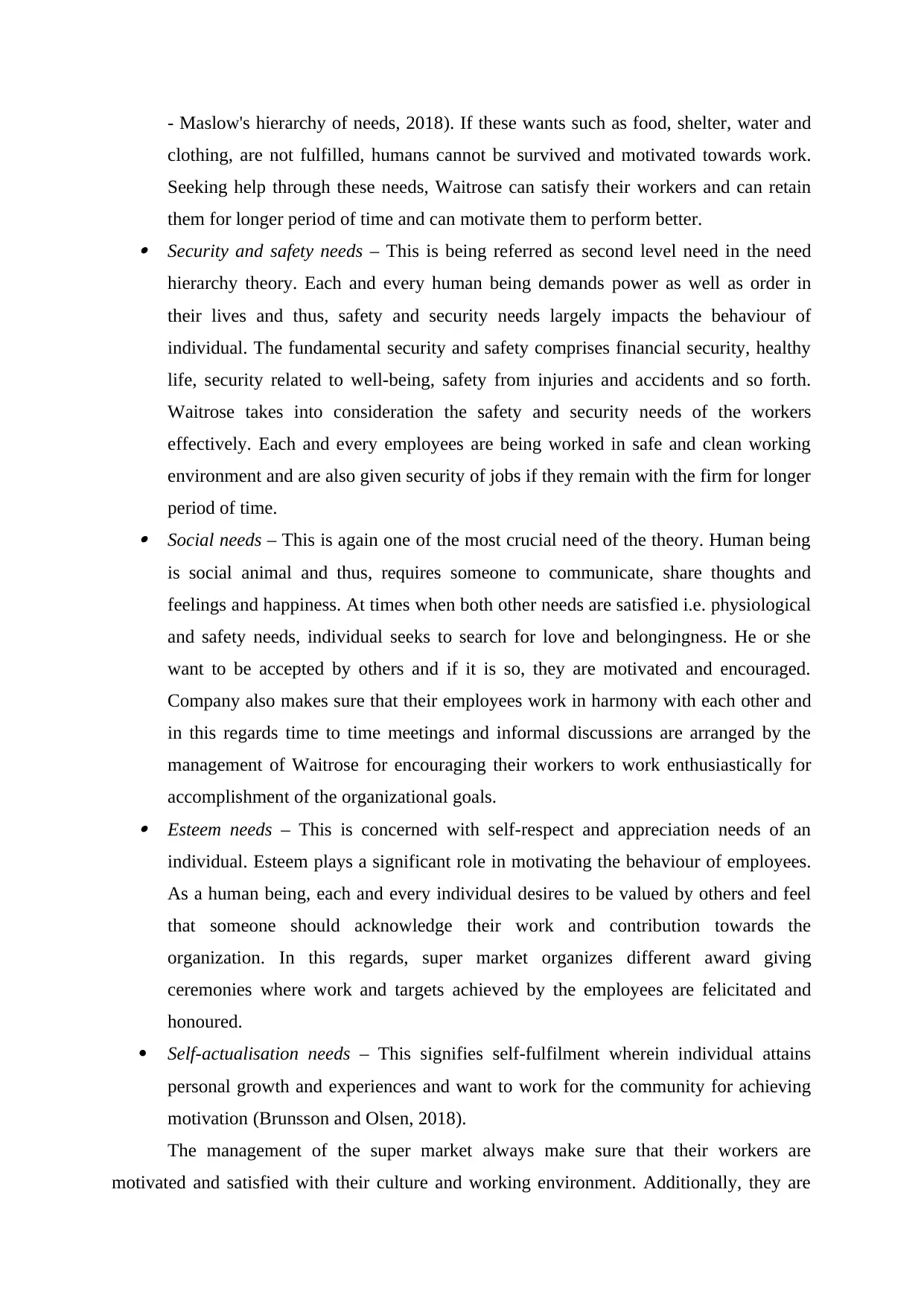
- Maslow's hierarchy of needs, 2018). If these wants such as food, shelter, water and
clothing, are not fulfilled, humans cannot be survived and motivated towards work.
Seeking help through these needs, Waitrose can satisfy their workers and can retain
them for longer period of time and can motivate them to perform better. Security and safety needs – This is being referred as second level need in the need
hierarchy theory. Each and every human being demands power as well as order in
their lives and thus, safety and security needs largely impacts the behaviour of
individual. The fundamental security and safety comprises financial security, healthy
life, security related to well-being, safety from injuries and accidents and so forth.
Waitrose takes into consideration the safety and security needs of the workers
effectively. Each and every employees are being worked in safe and clean working
environment and are also given security of jobs if they remain with the firm for longer
period of time. Social needs – This is again one of the most crucial need of the theory. Human being
is social animal and thus, requires someone to communicate, share thoughts and
feelings and happiness. At times when both other needs are satisfied i.e. physiological
and safety needs, individual seeks to search for love and belongingness. He or she
want to be accepted by others and if it is so, they are motivated and encouraged.
Company also makes sure that their employees work in harmony with each other and
in this regards time to time meetings and informal discussions are arranged by the
management of Waitrose for encouraging their workers to work enthusiastically for
accomplishment of the organizational goals. Esteem needs – This is concerned with self-respect and appreciation needs of an
individual. Esteem plays a significant role in motivating the behaviour of employees.
As a human being, each and every individual desires to be valued by others and feel
that someone should acknowledge their work and contribution towards the
organization. In this regards, super market organizes different award giving
ceremonies where work and targets achieved by the employees are felicitated and
honoured.
Self-actualisation needs – This signifies self-fulfilment wherein individual attains
personal growth and experiences and want to work for the community for achieving
motivation (Brunsson and Olsen, 2018).
The management of the super market always make sure that their workers are
motivated and satisfied with their culture and working environment. Additionally, they are
clothing, are not fulfilled, humans cannot be survived and motivated towards work.
Seeking help through these needs, Waitrose can satisfy their workers and can retain
them for longer period of time and can motivate them to perform better. Security and safety needs – This is being referred as second level need in the need
hierarchy theory. Each and every human being demands power as well as order in
their lives and thus, safety and security needs largely impacts the behaviour of
individual. The fundamental security and safety comprises financial security, healthy
life, security related to well-being, safety from injuries and accidents and so forth.
Waitrose takes into consideration the safety and security needs of the workers
effectively. Each and every employees are being worked in safe and clean working
environment and are also given security of jobs if they remain with the firm for longer
period of time. Social needs – This is again one of the most crucial need of the theory. Human being
is social animal and thus, requires someone to communicate, share thoughts and
feelings and happiness. At times when both other needs are satisfied i.e. physiological
and safety needs, individual seeks to search for love and belongingness. He or she
want to be accepted by others and if it is so, they are motivated and encouraged.
Company also makes sure that their employees work in harmony with each other and
in this regards time to time meetings and informal discussions are arranged by the
management of Waitrose for encouraging their workers to work enthusiastically for
accomplishment of the organizational goals. Esteem needs – This is concerned with self-respect and appreciation needs of an
individual. Esteem plays a significant role in motivating the behaviour of employees.
As a human being, each and every individual desires to be valued by others and feel
that someone should acknowledge their work and contribution towards the
organization. In this regards, super market organizes different award giving
ceremonies where work and targets achieved by the employees are felicitated and
honoured.
Self-actualisation needs – This signifies self-fulfilment wherein individual attains
personal growth and experiences and want to work for the community for achieving
motivation (Brunsson and Olsen, 2018).
The management of the super market always make sure that their workers are
motivated and satisfied with their culture and working environment. Additionally, they are
⊘ This is a preview!⊘
Do you want full access?
Subscribe today to unlock all pages.

Trusted by 1+ million students worldwide
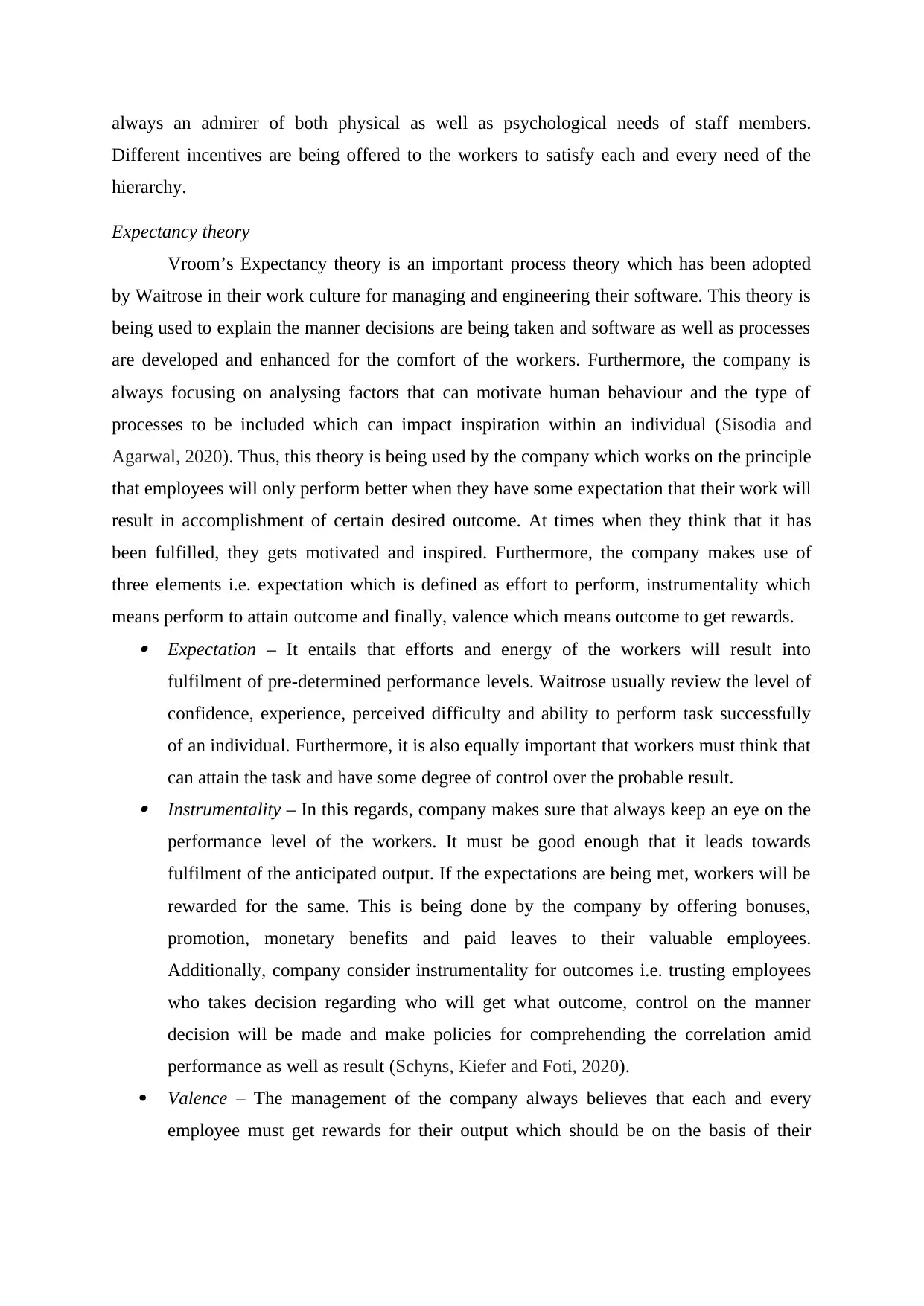
always an admirer of both physical as well as psychological needs of staff members.
Different incentives are being offered to the workers to satisfy each and every need of the
hierarchy.
Expectancy theory
Vroom’s Expectancy theory is an important process theory which has been adopted
by Waitrose in their work culture for managing and engineering their software. This theory is
being used to explain the manner decisions are being taken and software as well as processes
are developed and enhanced for the comfort of the workers. Furthermore, the company is
always focusing on analysing factors that can motivate human behaviour and the type of
processes to be included which can impact inspiration within an individual (Sisodia and
Agarwal, 2020). Thus, this theory is being used by the company which works on the principle
that employees will only perform better when they have some expectation that their work will
result in accomplishment of certain desired outcome. At times when they think that it has
been fulfilled, they gets motivated and inspired. Furthermore, the company makes use of
three elements i.e. expectation which is defined as effort to perform, instrumentality which
means perform to attain outcome and finally, valence which means outcome to get rewards. Expectation – It entails that efforts and energy of the workers will result into
fulfilment of pre-determined performance levels. Waitrose usually review the level of
confidence, experience, perceived difficulty and ability to perform task successfully
of an individual. Furthermore, it is also equally important that workers must think that
can attain the task and have some degree of control over the probable result. Instrumentality – In this regards, company makes sure that always keep an eye on the
performance level of the workers. It must be good enough that it leads towards
fulfilment of the anticipated output. If the expectations are being met, workers will be
rewarded for the same. This is being done by the company by offering bonuses,
promotion, monetary benefits and paid leaves to their valuable employees.
Additionally, company consider instrumentality for outcomes i.e. trusting employees
who takes decision regarding who will get what outcome, control on the manner
decision will be made and make policies for comprehending the correlation amid
performance as well as result (Schyns, Kiefer and Foti, 2020).
Valence – The management of the company always believes that each and every
employee must get rewards for their output which should be on the basis of their
Different incentives are being offered to the workers to satisfy each and every need of the
hierarchy.
Expectancy theory
Vroom’s Expectancy theory is an important process theory which has been adopted
by Waitrose in their work culture for managing and engineering their software. This theory is
being used to explain the manner decisions are being taken and software as well as processes
are developed and enhanced for the comfort of the workers. Furthermore, the company is
always focusing on analysing factors that can motivate human behaviour and the type of
processes to be included which can impact inspiration within an individual (Sisodia and
Agarwal, 2020). Thus, this theory is being used by the company which works on the principle
that employees will only perform better when they have some expectation that their work will
result in accomplishment of certain desired outcome. At times when they think that it has
been fulfilled, they gets motivated and inspired. Furthermore, the company makes use of
three elements i.e. expectation which is defined as effort to perform, instrumentality which
means perform to attain outcome and finally, valence which means outcome to get rewards. Expectation – It entails that efforts and energy of the workers will result into
fulfilment of pre-determined performance levels. Waitrose usually review the level of
confidence, experience, perceived difficulty and ability to perform task successfully
of an individual. Furthermore, it is also equally important that workers must think that
can attain the task and have some degree of control over the probable result. Instrumentality – In this regards, company makes sure that always keep an eye on the
performance level of the workers. It must be good enough that it leads towards
fulfilment of the anticipated output. If the expectations are being met, workers will be
rewarded for the same. This is being done by the company by offering bonuses,
promotion, monetary benefits and paid leaves to their valuable employees.
Additionally, company consider instrumentality for outcomes i.e. trusting employees
who takes decision regarding who will get what outcome, control on the manner
decision will be made and make policies for comprehending the correlation amid
performance as well as result (Schyns, Kiefer and Foti, 2020).
Valence – The management of the company always believes that each and every
employee must get rewards for their output which should be on the basis of their
Paraphrase This Document
Need a fresh take? Get an instant paraphrase of this document with our AI Paraphraser
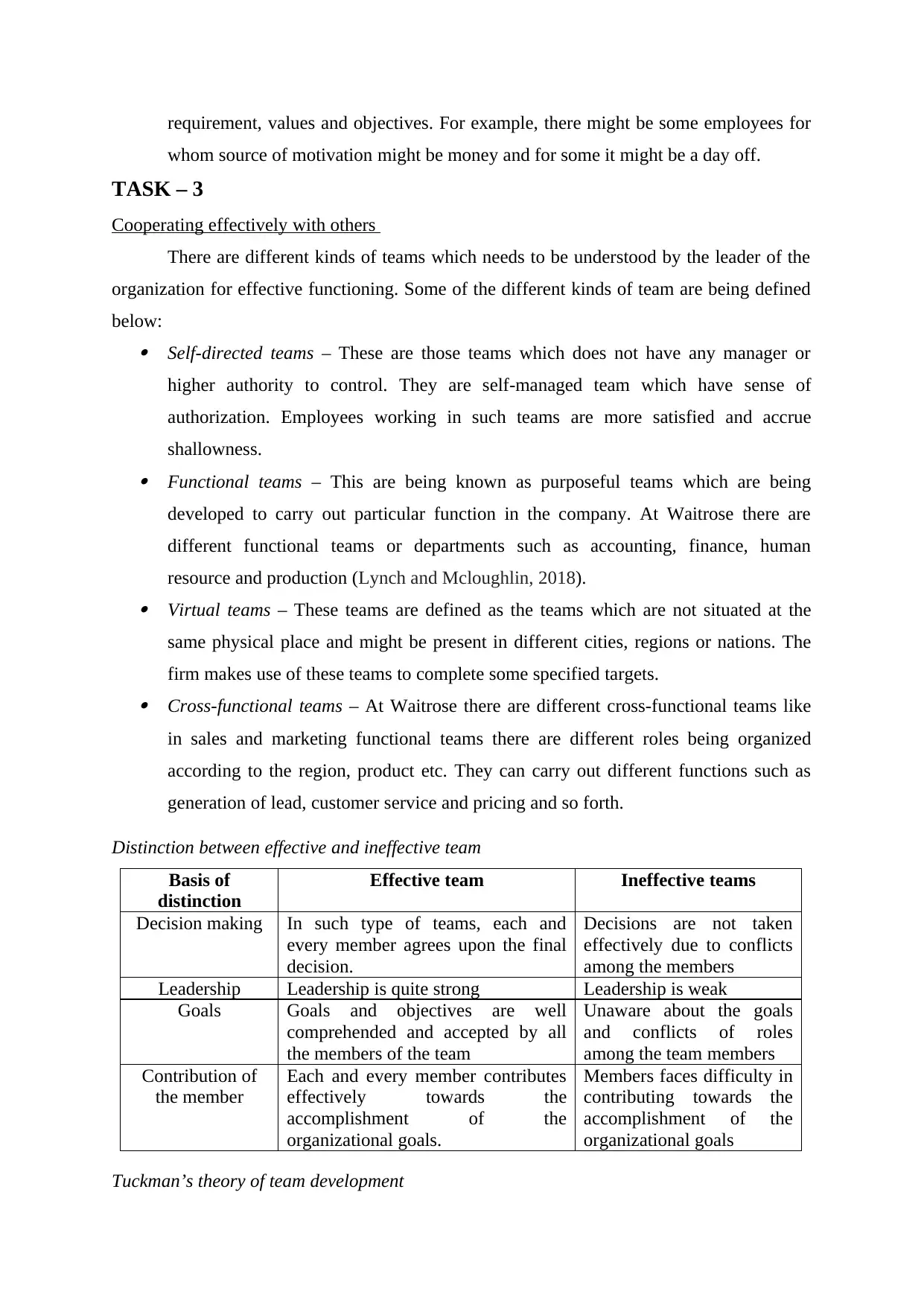
requirement, values and objectives. For example, there might be some employees for
whom source of motivation might be money and for some it might be a day off.
TASK – 3
Cooperating effectively with others
There are different kinds of teams which needs to be understood by the leader of the
organization for effective functioning. Some of the different kinds of team are being defined
below: Self-directed teams – These are those teams which does not have any manager or
higher authority to control. They are self-managed team which have sense of
authorization. Employees working in such teams are more satisfied and accrue
shallowness. Functional teams – This are being known as purposeful teams which are being
developed to carry out particular function in the company. At Waitrose there are
different functional teams or departments such as accounting, finance, human
resource and production (Lynch and Mcloughlin, 2018). Virtual teams – These teams are defined as the teams which are not situated at the
same physical place and might be present in different cities, regions or nations. The
firm makes use of these teams to complete some specified targets. Cross-functional teams – At Waitrose there are different cross-functional teams like
in sales and marketing functional teams there are different roles being organized
according to the region, product etc. They can carry out different functions such as
generation of lead, customer service and pricing and so forth.
Distinction between effective and ineffective team
Basis of
distinction
Effective team Ineffective teams
Decision making In such type of teams, each and
every member agrees upon the final
decision.
Decisions are not taken
effectively due to conflicts
among the members
Leadership Leadership is quite strong Leadership is weak
Goals Goals and objectives are well
comprehended and accepted by all
the members of the team
Unaware about the goals
and conflicts of roles
among the team members
Contribution of
the member
Each and every member contributes
effectively towards the
accomplishment of the
organizational goals.
Members faces difficulty in
contributing towards the
accomplishment of the
organizational goals
Tuckman’s theory of team development
whom source of motivation might be money and for some it might be a day off.
TASK – 3
Cooperating effectively with others
There are different kinds of teams which needs to be understood by the leader of the
organization for effective functioning. Some of the different kinds of team are being defined
below: Self-directed teams – These are those teams which does not have any manager or
higher authority to control. They are self-managed team which have sense of
authorization. Employees working in such teams are more satisfied and accrue
shallowness. Functional teams – This are being known as purposeful teams which are being
developed to carry out particular function in the company. At Waitrose there are
different functional teams or departments such as accounting, finance, human
resource and production (Lynch and Mcloughlin, 2018). Virtual teams – These teams are defined as the teams which are not situated at the
same physical place and might be present in different cities, regions or nations. The
firm makes use of these teams to complete some specified targets. Cross-functional teams – At Waitrose there are different cross-functional teams like
in sales and marketing functional teams there are different roles being organized
according to the region, product etc. They can carry out different functions such as
generation of lead, customer service and pricing and so forth.
Distinction between effective and ineffective team
Basis of
distinction
Effective team Ineffective teams
Decision making In such type of teams, each and
every member agrees upon the final
decision.
Decisions are not taken
effectively due to conflicts
among the members
Leadership Leadership is quite strong Leadership is weak
Goals Goals and objectives are well
comprehended and accepted by all
the members of the team
Unaware about the goals
and conflicts of roles
among the team members
Contribution of
the member
Each and every member contributes
effectively towards the
accomplishment of the
organizational goals.
Members faces difficulty in
contributing towards the
accomplishment of the
organizational goals
Tuckman’s theory of team development
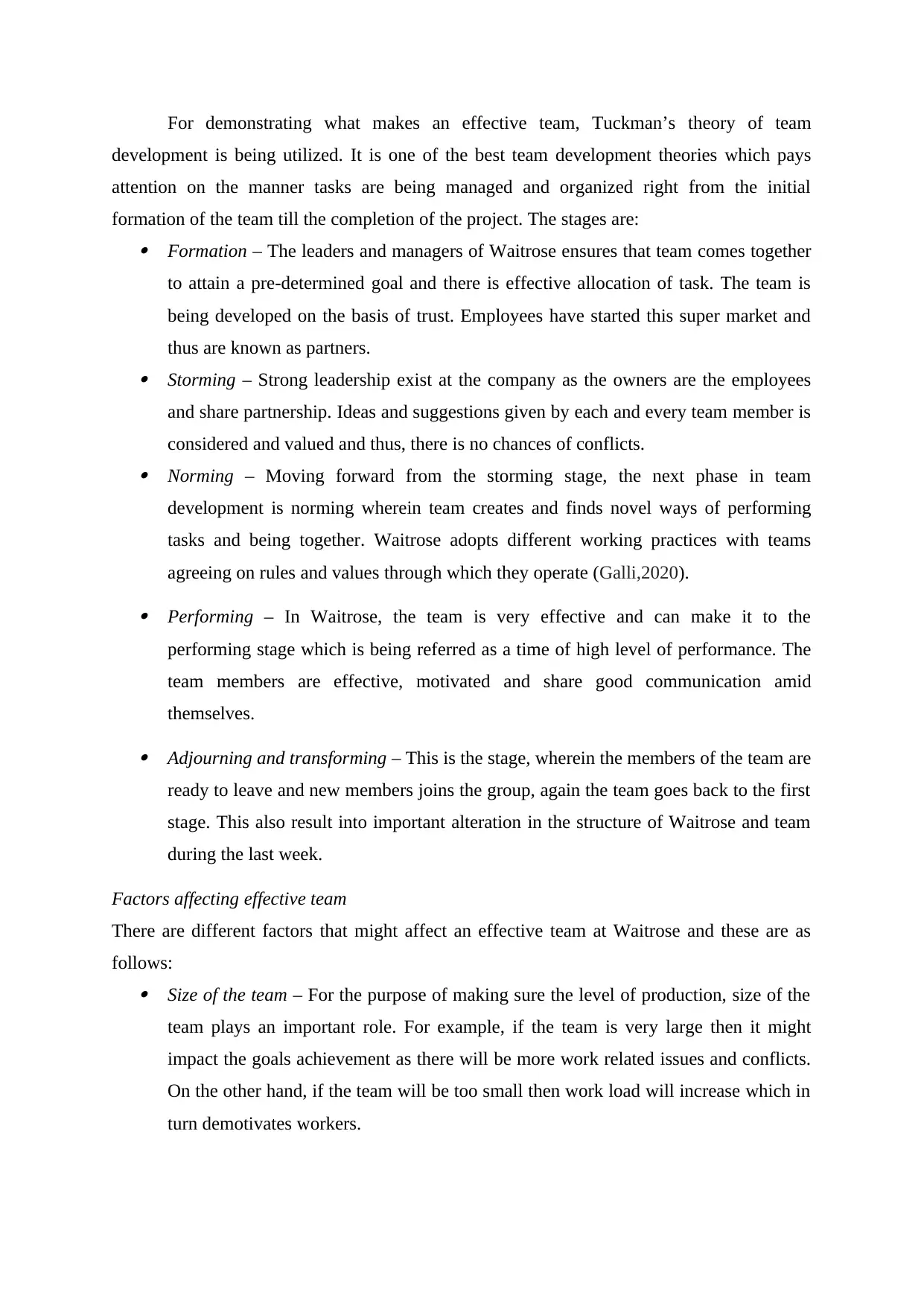
For demonstrating what makes an effective team, Tuckman’s theory of team
development is being utilized. It is one of the best team development theories which pays
attention on the manner tasks are being managed and organized right from the initial
formation of the team till the completion of the project. The stages are: Formation – The leaders and managers of Waitrose ensures that team comes together
to attain a pre-determined goal and there is effective allocation of task. The team is
being developed on the basis of trust. Employees have started this super market and
thus are known as partners. Storming – Strong leadership exist at the company as the owners are the employees
and share partnership. Ideas and suggestions given by each and every team member is
considered and valued and thus, there is no chances of conflicts. Norming – Moving forward from the storming stage, the next phase in team
development is norming wherein team creates and finds novel ways of performing
tasks and being together. Waitrose adopts different working practices with teams
agreeing on rules and values through which they operate (Galli,2020). Performing – In Waitrose, the team is very effective and can make it to the
performing stage which is being referred as a time of high level of performance. The
team members are effective, motivated and share good communication amid
themselves. Adjourning and transforming – This is the stage, wherein the members of the team are
ready to leave and new members joins the group, again the team goes back to the first
stage. This also result into important alteration in the structure of Waitrose and team
during the last week.
Factors affecting effective team
There are different factors that might affect an effective team at Waitrose and these are as
follows: Size of the team – For the purpose of making sure the level of production, size of the
team plays an important role. For example, if the team is very large then it might
impact the goals achievement as there will be more work related issues and conflicts.
On the other hand, if the team will be too small then work load will increase which in
turn demotivates workers.
development is being utilized. It is one of the best team development theories which pays
attention on the manner tasks are being managed and organized right from the initial
formation of the team till the completion of the project. The stages are: Formation – The leaders and managers of Waitrose ensures that team comes together
to attain a pre-determined goal and there is effective allocation of task. The team is
being developed on the basis of trust. Employees have started this super market and
thus are known as partners. Storming – Strong leadership exist at the company as the owners are the employees
and share partnership. Ideas and suggestions given by each and every team member is
considered and valued and thus, there is no chances of conflicts. Norming – Moving forward from the storming stage, the next phase in team
development is norming wherein team creates and finds novel ways of performing
tasks and being together. Waitrose adopts different working practices with teams
agreeing on rules and values through which they operate (Galli,2020). Performing – In Waitrose, the team is very effective and can make it to the
performing stage which is being referred as a time of high level of performance. The
team members are effective, motivated and share good communication amid
themselves. Adjourning and transforming – This is the stage, wherein the members of the team are
ready to leave and new members joins the group, again the team goes back to the first
stage. This also result into important alteration in the structure of Waitrose and team
during the last week.
Factors affecting effective team
There are different factors that might affect an effective team at Waitrose and these are as
follows: Size of the team – For the purpose of making sure the level of production, size of the
team plays an important role. For example, if the team is very large then it might
impact the goals achievement as there will be more work related issues and conflicts.
On the other hand, if the team will be too small then work load will increase which in
turn demotivates workers.
⊘ This is a preview!⊘
Do you want full access?
Subscribe today to unlock all pages.

Trusted by 1+ million students worldwide
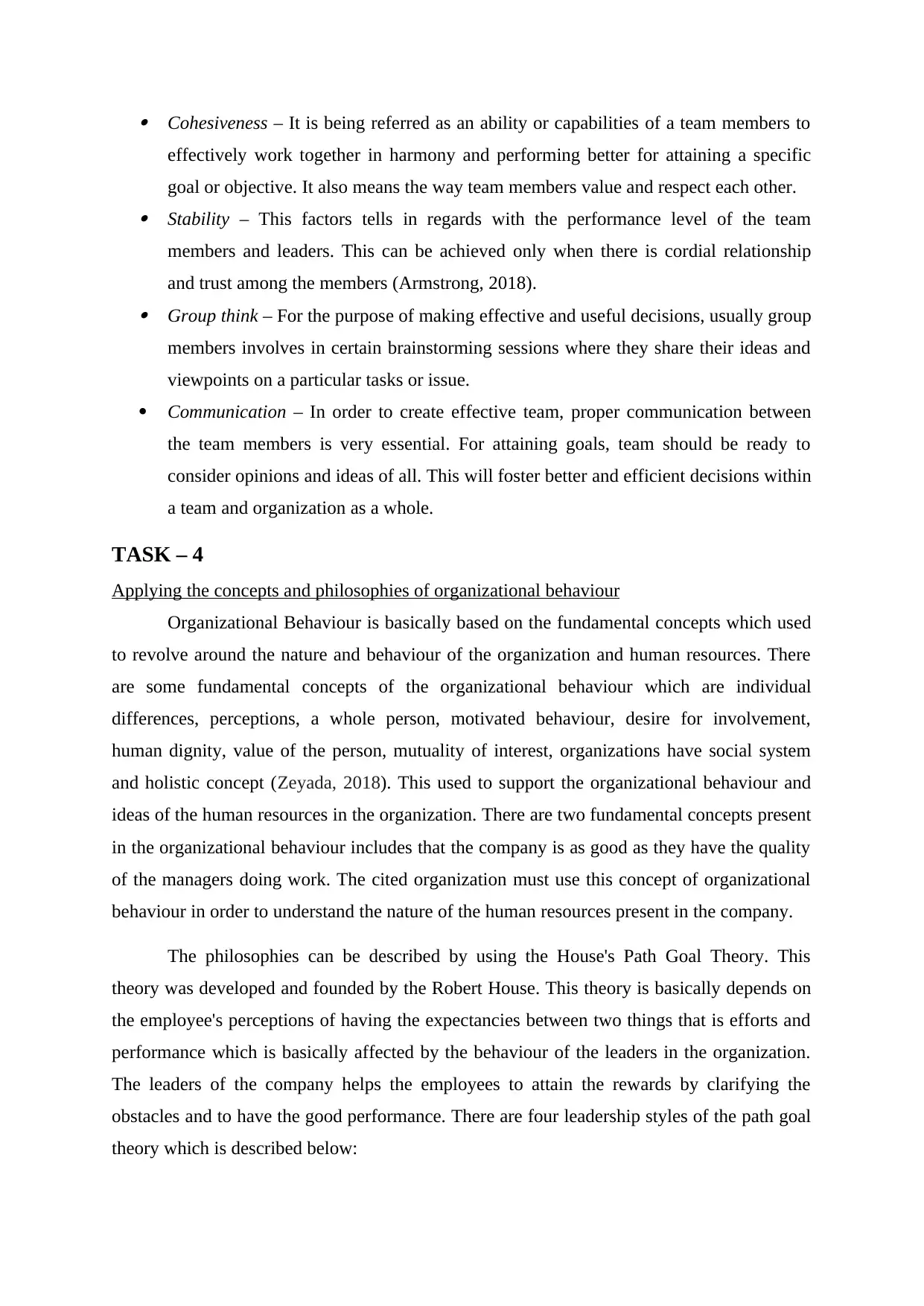
Cohesiveness – It is being referred as an ability or capabilities of a team members to
effectively work together in harmony and performing better for attaining a specific
goal or objective. It also means the way team members value and respect each other. Stability – This factors tells in regards with the performance level of the team
members and leaders. This can be achieved only when there is cordial relationship
and trust among the members (Armstrong, 2018). Group think – For the purpose of making effective and useful decisions, usually group
members involves in certain brainstorming sessions where they share their ideas and
viewpoints on a particular tasks or issue.
Communication – In order to create effective team, proper communication between
the team members is very essential. For attaining goals, team should be ready to
consider opinions and ideas of all. This will foster better and efficient decisions within
a team and organization as a whole.
TASK – 4
Applying the concepts and philosophies of organizational behaviour
Organizational Behaviour is basically based on the fundamental concepts which used
to revolve around the nature and behaviour of the organization and human resources. There
are some fundamental concepts of the organizational behaviour which are individual
differences, perceptions, a whole person, motivated behaviour, desire for involvement,
human dignity, value of the person, mutuality of interest, organizations have social system
and holistic concept (Zeyada, 2018). This used to support the organizational behaviour and
ideas of the human resources in the organization. There are two fundamental concepts present
in the organizational behaviour includes that the company is as good as they have the quality
of the managers doing work. The cited organization must use this concept of organizational
behaviour in order to understand the nature of the human resources present in the company.
The philosophies can be described by using the House's Path Goal Theory. This
theory was developed and founded by the Robert House. This theory is basically depends on
the employee's perceptions of having the expectancies between two things that is efforts and
performance which is basically affected by the behaviour of the leaders in the organization.
The leaders of the company helps the employees to attain the rewards by clarifying the
obstacles and to have the good performance. There are four leadership styles of the path goal
theory which is described below:
effectively work together in harmony and performing better for attaining a specific
goal or objective. It also means the way team members value and respect each other. Stability – This factors tells in regards with the performance level of the team
members and leaders. This can be achieved only when there is cordial relationship
and trust among the members (Armstrong, 2018). Group think – For the purpose of making effective and useful decisions, usually group
members involves in certain brainstorming sessions where they share their ideas and
viewpoints on a particular tasks or issue.
Communication – In order to create effective team, proper communication between
the team members is very essential. For attaining goals, team should be ready to
consider opinions and ideas of all. This will foster better and efficient decisions within
a team and organization as a whole.
TASK – 4
Applying the concepts and philosophies of organizational behaviour
Organizational Behaviour is basically based on the fundamental concepts which used
to revolve around the nature and behaviour of the organization and human resources. There
are some fundamental concepts of the organizational behaviour which are individual
differences, perceptions, a whole person, motivated behaviour, desire for involvement,
human dignity, value of the person, mutuality of interest, organizations have social system
and holistic concept (Zeyada, 2018). This used to support the organizational behaviour and
ideas of the human resources in the organization. There are two fundamental concepts present
in the organizational behaviour includes that the company is as good as they have the quality
of the managers doing work. The cited organization must use this concept of organizational
behaviour in order to understand the nature of the human resources present in the company.
The philosophies can be described by using the House's Path Goal Theory. This
theory was developed and founded by the Robert House. This theory is basically depends on
the employee's perceptions of having the expectancies between two things that is efforts and
performance which is basically affected by the behaviour of the leaders in the organization.
The leaders of the company helps the employees to attain the rewards by clarifying the
obstacles and to have the good performance. There are four leadership styles of the path goal
theory which is described below:
Paraphrase This Document
Need a fresh take? Get an instant paraphrase of this document with our AI Paraphraser
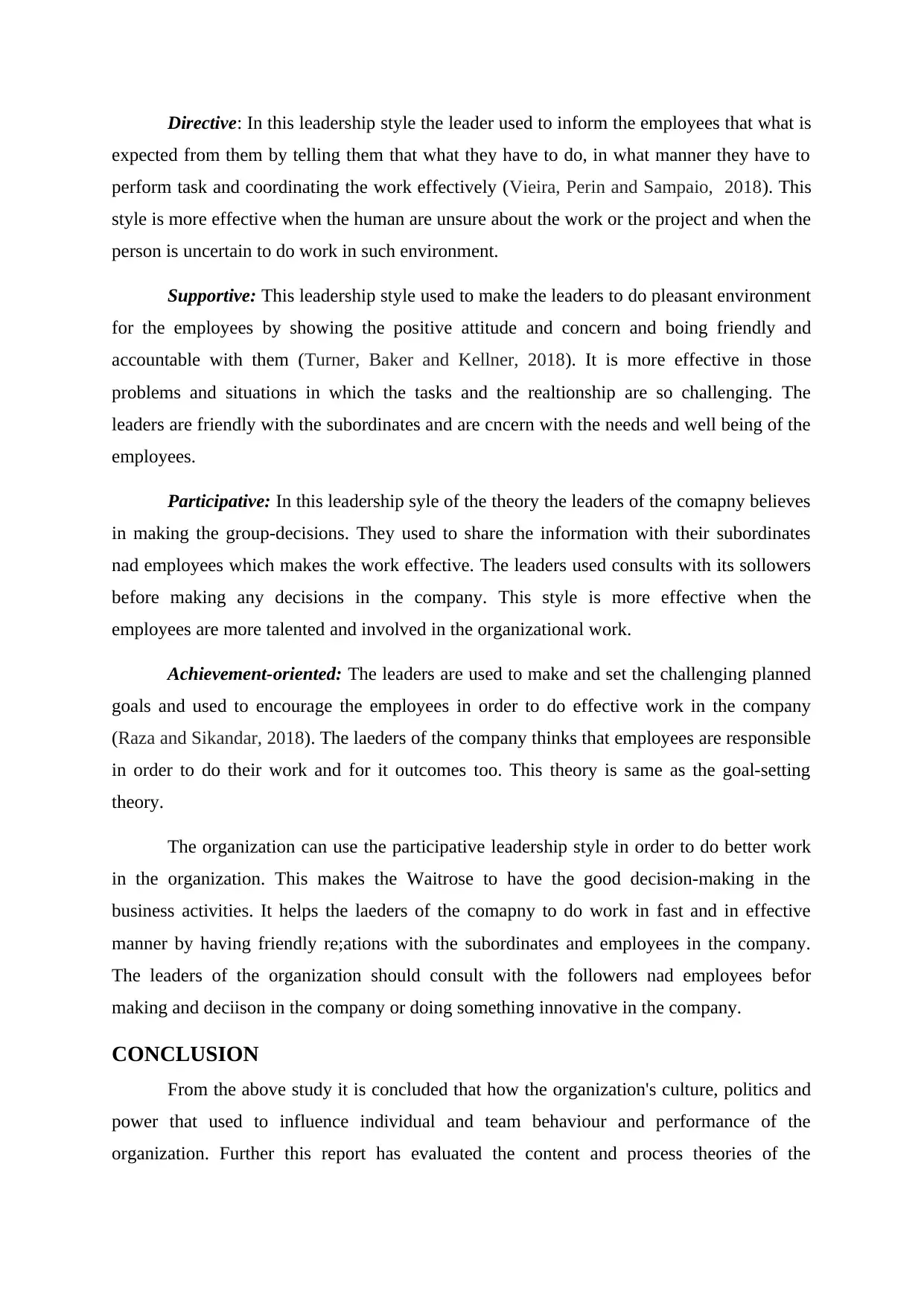
Directive: In this leadership style the leader used to inform the employees that what is
expected from them by telling them that what they have to do, in what manner they have to
perform task and coordinating the work effectively (Vieira, Perin and Sampaio, 2018). This
style is more effective when the human are unsure about the work or the project and when the
person is uncertain to do work in such environment.
Supportive: This leadership style used to make the leaders to do pleasant environment
for the employees by showing the positive attitude and concern and boing friendly and
accountable with them (Turner, Baker and Kellner, 2018). It is more effective in those
problems and situations in which the tasks and the realtionship are so challenging. The
leaders are friendly with the subordinates and are cncern with the needs and well being of the
employees.
Participative: In this leadership syle of the theory the leaders of the comapny believes
in making the group-decisions. They used to share the information with their subordinates
nad employees which makes the work effective. The leaders used consults with its sollowers
before making any decisions in the company. This style is more effective when the
employees are more talented and involved in the organizational work.
Achievement-oriented: The leaders are used to make and set the challenging planned
goals and used to encourage the employees in order to do effective work in the company
(Raza and Sikandar, 2018). The laeders of the company thinks that employees are responsible
in order to do their work and for it outcomes too. This theory is same as the goal-setting
theory.
The organization can use the participative leadership style in order to do better work
in the organization. This makes the Waitrose to have the good decision-making in the
business activities. It helps the laeders of the comapny to do work in fast and in effective
manner by having friendly re;ations with the subordinates and employees in the company.
The leaders of the organization should consult with the followers nad employees befor
making and deciison in the company or doing something innovative in the company.
CONCLUSION
From the above study it is concluded that how the organization's culture, politics and
power that used to influence individual and team behaviour and performance of the
organization. Further this report has evaluated the content and process theories of the
expected from them by telling them that what they have to do, in what manner they have to
perform task and coordinating the work effectively (Vieira, Perin and Sampaio, 2018). This
style is more effective when the human are unsure about the work or the project and when the
person is uncertain to do work in such environment.
Supportive: This leadership style used to make the leaders to do pleasant environment
for the employees by showing the positive attitude and concern and boing friendly and
accountable with them (Turner, Baker and Kellner, 2018). It is more effective in those
problems and situations in which the tasks and the realtionship are so challenging. The
leaders are friendly with the subordinates and are cncern with the needs and well being of the
employees.
Participative: In this leadership syle of the theory the leaders of the comapny believes
in making the group-decisions. They used to share the information with their subordinates
nad employees which makes the work effective. The leaders used consults with its sollowers
before making any decisions in the company. This style is more effective when the
employees are more talented and involved in the organizational work.
Achievement-oriented: The leaders are used to make and set the challenging planned
goals and used to encourage the employees in order to do effective work in the company
(Raza and Sikandar, 2018). The laeders of the company thinks that employees are responsible
in order to do their work and for it outcomes too. This theory is same as the goal-setting
theory.
The organization can use the participative leadership style in order to do better work
in the organization. This makes the Waitrose to have the good decision-making in the
business activities. It helps the laeders of the comapny to do work in fast and in effective
manner by having friendly re;ations with the subordinates and employees in the company.
The leaders of the organization should consult with the followers nad employees befor
making and deciison in the company or doing something innovative in the company.
CONCLUSION
From the above study it is concluded that how the organization's culture, politics and
power that used to influence individual and team behaviour and performance of the
organization. Further this report has evaluated the content and process theories of the
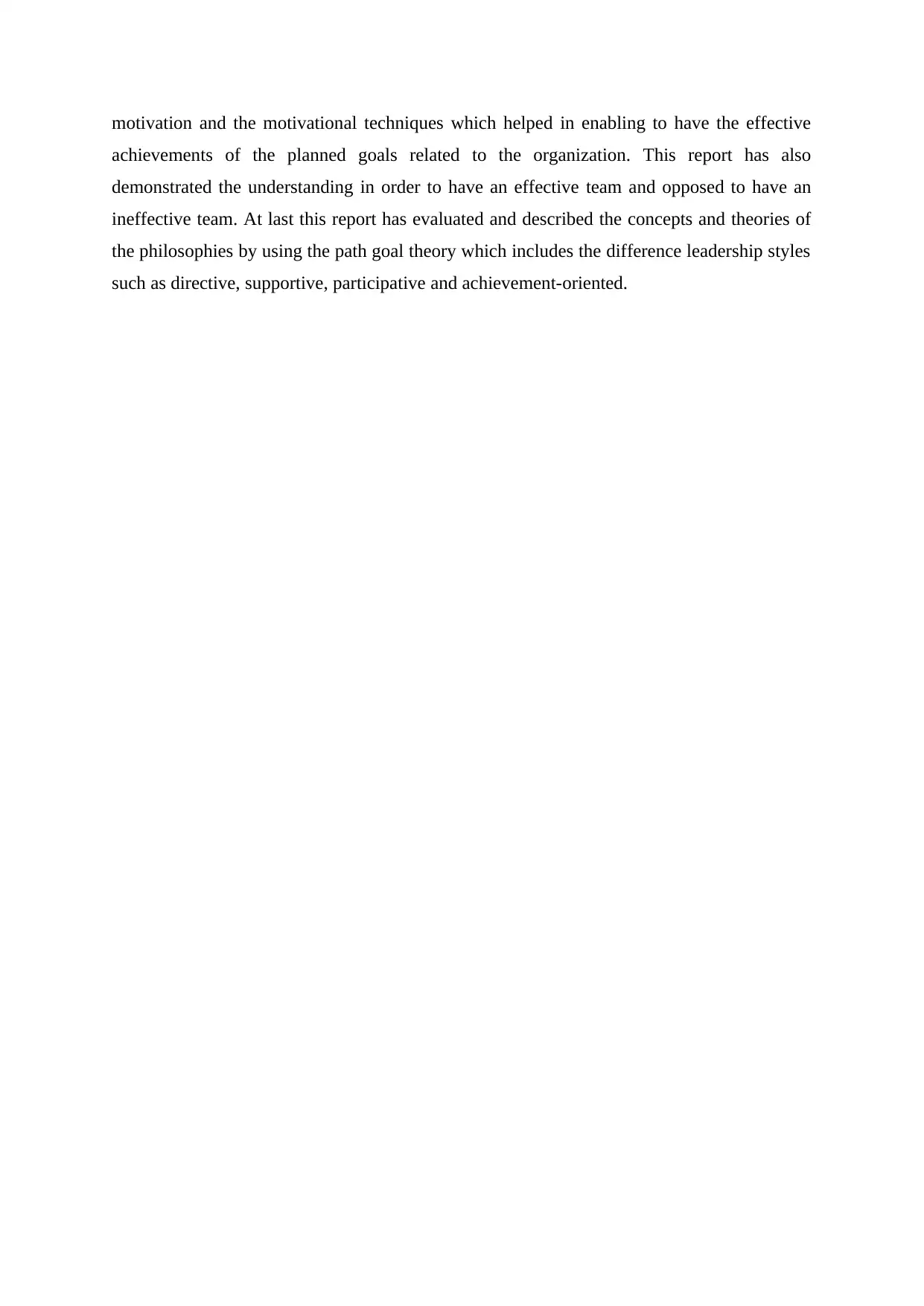
motivation and the motivational techniques which helped in enabling to have the effective
achievements of the planned goals related to the organization. This report has also
demonstrated the understanding in order to have an effective team and opposed to have an
ineffective team. At last this report has evaluated and described the concepts and theories of
the philosophies by using the path goal theory which includes the difference leadership styles
such as directive, supportive, participative and achievement-oriented.
achievements of the planned goals related to the organization. This report has also
demonstrated the understanding in order to have an effective team and opposed to have an
ineffective team. At last this report has evaluated and described the concepts and theories of
the philosophies by using the path goal theory which includes the difference leadership styles
such as directive, supportive, participative and achievement-oriented.
⊘ This is a preview!⊘
Do you want full access?
Subscribe today to unlock all pages.

Trusted by 1+ million students worldwide
1 out of 13
Related Documents
Your All-in-One AI-Powered Toolkit for Academic Success.
+13062052269
info@desklib.com
Available 24*7 on WhatsApp / Email
![[object Object]](/_next/static/media/star-bottom.7253800d.svg)
Unlock your academic potential
Copyright © 2020–2026 A2Z Services. All Rights Reserved. Developed and managed by ZUCOL.





